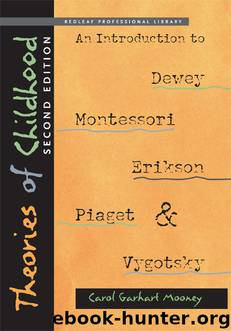Theories of Childhood by Carol Garhart Mooney

Author:Carol Garhart Mooney [Mooney, Carol Garhart]
Language: eng
Format: epub
ISBN: 9781605542485
Publisher: Redleaf Press
Initiative versus Guilt
The third and last stage of Erikson’s theory that addresses the early childhood years is initiative versus guilt. Most four-and five-year-olds are at this stage, which is therefore a key one for preschool and kindergarten teachers to know about. The developmental task of this stage is to acquire a sense of purpose.
Erikson describes children of this age as energetic and ready to learn. Typically developing children will forget failures more quickly by four or five. They are more willing to listen and learn from teachers, parents, and other children. At this stage children are growing in ways that make them much more actively focused and less defiant. Children who have negotiated their second stage successfully have established their autonomy, so they act less for the sake of individual control and more to get things done. Children who successfully accomplish the developmental tasks of this stage will emerge confident and competent. They will believe that they can plan and complete a task independently. They will be able to cope with and learn from mistakes without feeling guilty for things that don’t go as planned.
At first glance, this stage seems much easier for adults caring for children than the previous two. Part of that has to do with children’s growing cognitive and physical abilities. The developmental task also does not require as much energy from adults. In addition, it involves less of the aggressive behavior that is so much a part of toddler development. According to Erikson, however, it is a time when the child’s development can split in one of two possible directions: human potential for glory or for destruction. If we encourage preschool children to use their energy in an active and involved way, their confidence will grow. Their competence will increase. If we do for them what they can do for themselves or if we focus on the mistakes they make on the way to developing new skills, their sense of initiative can turn to guilt and discouragement. Again, just as we revisited the concept of developing independence in the last chapter, it is critical to do so here as well. There seems to be less tendency today to focus on children’s mistakes in a negative way. However (as previously stated and cited), there is a documented trend of parents consistently doing for children what they are capable of doing themselves.
Of course, most teachers don’t purposefully focus on children’s mistakes instead of on their successes. However, according to Erikson, when teachers hover near the easel, wiping up each drop of paint that goes astray, children are likely to feel less competent and take fewer risks in learning. I once observed a teacher who was great with insects, farm units, and birds. But whenever the children played with water or sand, she was visibly unsettled. I watched her one morning sweeping up sand as soon as it fell from the sand table. She hovered around the water table with towels, wiping up every drop that hit the floor. She always smiled at the children.
Download
This site does not store any files on its server. We only index and link to content provided by other sites. Please contact the content providers to delete copyright contents if any and email us, we'll remove relevant links or contents immediately.
| Administration | Assessment |
| Educational Psychology | Experimental Methods |
| History | Language Experience Approach |
| Philosophy & Social Aspects | Reform & Policy |
| Research |
The Art of Coaching Workbook by Elena Aguilar(51198)
Trainspotting by Irvine Welsh(21662)
Twilight of the Idols With the Antichrist and Ecce Homo by Friedrich Nietzsche(18632)
Fangirl by Rainbow Rowell(9247)
Periodization Training for Sports by Tudor Bompa(8271)
Change Your Questions, Change Your Life by Marilee Adams(7780)
This Is How You Lose Her by Junot Diaz(6885)
Asking the Right Questions: A Guide to Critical Thinking by M. Neil Browne & Stuart M. Keeley(5772)
Grit by Angela Duckworth(5614)
Red Sparrow by Jason Matthews(5471)
Paper Towns by Green John(5188)
Room 212 by Kate Stewart(5119)
Ken Follett - World without end by Ken Follett(4731)
Housekeeping by Marilynne Robinson(4445)
The Sports Rules Book by Human Kinetics(4385)
Papillon (English) by Henri Charrière(4274)
Double Down (Diary of a Wimpy Kid Book 11) by Jeff Kinney(4268)
The Motorcycle Diaries by Ernesto Che Guevara(4098)
Exercise Technique Manual for Resistance Training by National Strength & Conditioning Association(4071)
